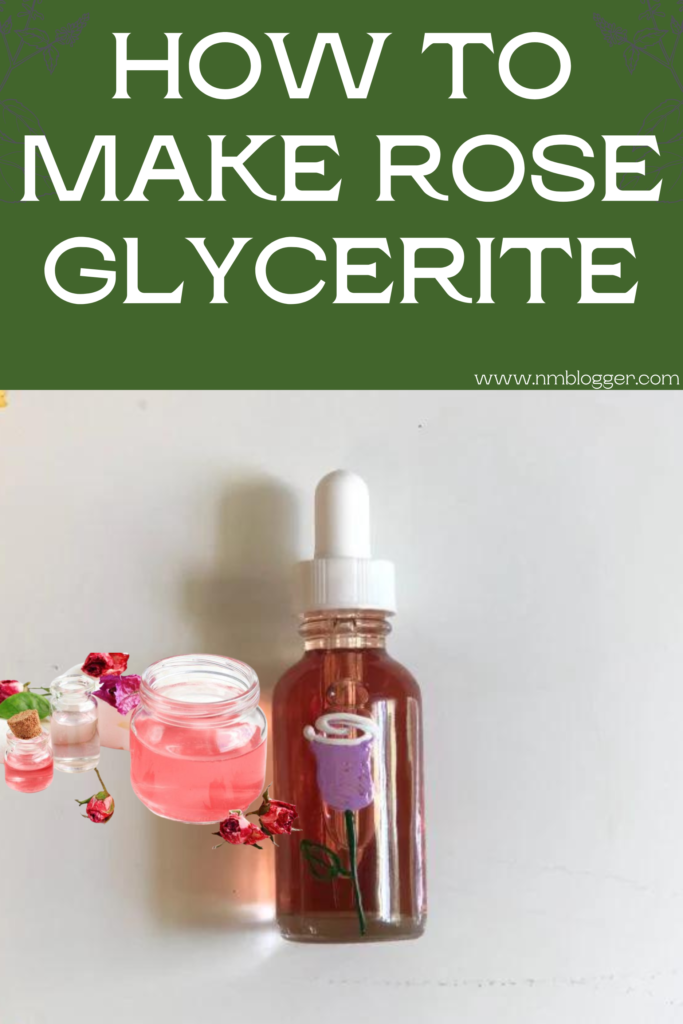How to Make Rose Glycerite
How to Make Rose Glycerite: A Step-by-Step Guide
Rose glycerite is a beautiful, fragrant extract made from fresh or dried rose petals and vegetable glycerin. It offers numerous benefits for the skin, including hydration, soothing irritation, and toning the skin. Rose glycerite can be used in skincare products, homemade toners, or even added to drinks for a mild floral flavor. Unlike alcohol-based extracts, glycerites are gentler on the skin, making them perfect for sensitive areas like the face.
Here’s how you can make your own rose glycerite at home.

Ingredients You Will Need:
- Rose petals – Fresh or dried (make sure they are pesticide-free and preferably organic)
- Vegetable glycerin – Food-grade or cosmetic-grade glycerin
- Distilled water – To dilute the glycerin
- Glass jar – A clean, sterilized jar with a tight-fitting lid
- Cheesecloth or fine mesh strainer – For straining the glycerite
Optional:
- Vitamin E oil (for preservation)
- Alcohol-free witch hazel (if you want to use the glycerite in a toner)
Step-by-Step Instructions:
Step 1: Prepare the Rose Petals
- If you are using fresh roses, carefully remove the petals and gently wash them to remove any dirt or impurities. Let them air dry for a few hours on a clean towel.
- If you’re using dried rose petals, ensure they are organic and free of any additives.
Step 2: Fill the Jar with Rose Petals
- Place the rose petals into a clean glass jar, filling it about halfway if using fresh petals, or about one-third if using dried petals. Dried petals are more concentrated, so you’ll need less.
Step 3: Prepare the Glycerin-Water Solution
- In a separate container, mix two parts vegetable glycerin to one part distilled water. This will create a diluted glycerin solution, which allows the petals to release their beneficial properties more easily.
- Example: If you use 1 cup of glycerin, mix it with ½ cup of distilled water.
Step 4: Pour the Glycerin Solution Over the Petals
- Pour the diluted glycerin solution over the rose petals in the jar. Make sure the petals are completely submerged in the liquid. If needed, gently press the petals down with a clean spoon to ensure they are fully covered.
Step 5: Seal and Let it Infuse
- Seal the jar tightly with the lid and give it a gentle shake to mix the contents. Store the jar in a cool, dark place for 2 to 4 weeks to allow the rose petals to infuse into the glycerin.
- Shake the jar gently every day to help the infusion process.
Step 6: Strain the Glycerite
- After 2 to 4 weeks, strain the mixture using cheesecloth or a fine mesh strainer. Squeeze out as much liquid as possible from the petals. You can also press the petals gently with the back of a spoon to extract all the liquid.
Step 7: Store Your Rose Glycerite
- Pour the strained glycerite into a clean, sterilized glass bottle or jar. If desired, add a few drops of Vitamin E oil to extend its shelf life (though glycerin itself is a natural preservative). Seal the jar tightly and store it in a cool, dark place. Properly stored, your rose glycerite can last up to 6 to 12 months.
How to Use Rose Glycerite:
- Facial toner: Mix a few drops of rose glycerite with distilled water or witch hazel to create a soothing, hydrating toner.
- Moisturizer: Add a few drops of rose glycerite to your regular moisturizer for added hydration and a natural glow.
- Face mist: Mix rose glycerite with distilled water in a spray bottle for a refreshing face mist.
- Add to DIY skincare products: You can use rose glycerite in lotions, creams, and serums for its hydrating and soothing benefits.
- Ingestible (optional): If your glycerite is made from food-grade ingredients, you can add a few drops to tea or water for a mildly floral flavor.
Benefits of Rose Glycerite:
- Hydration: Glycerin is a humectant, meaning it draws moisture into the skin, keeping it soft and hydrated.
- Soothing Properties: Rose petals are naturally anti-inflammatory and help calm irritated skin.
- Gentle on Skin: Rose glycerite is perfect for those with sensitive skin as it is alcohol-free and non-drying.
- Antioxidant-rich: Roses contain antioxidants that can help fight free radicals and promote healthier skin.